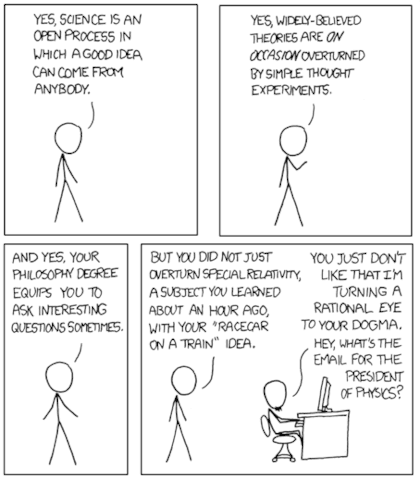Thoughts on the Complexity of Modern Science
Science today is incredibly complex. Anyone who ever did scientific research knows that, but many in the general public seem to be completely unaware of this. I think this is a point where science communication can improve.
- “I listened to some science TV show, and now I have come up with my theory.”
This could have a chance if the TV show would fully cover the topic. It does not.
- “Scientists don’t know detail X, therefore they know nothing.”
- “Scientists were once wrong in point Y, therefore we cannot trust any result.”
Frequently seen as a response to scientific arguments against various crackpottery.

It is not that easy. From xkcd
If you are unaware that theories are backed up by hundreds to thousands of measurements, each based on various other publications and often years of research covering tons of details and various cross-checks, then those misconceptions can come up. Can we do something against that?
When I get asked what I am working on in particle physics, I always try to give both the overview but also an impression of daily work: Yes, the long-term task can be something like the search for new particles. But what you do is more like calibrating the response of some detector part to particles at different detector temperatures, different radiation damage, or one of the hundreds of other tasks involved in the overall publication that produces one round of news in the popular press (if you are lucky). I’m not sure how that can be translated to TV shows, newspapers, and so on. “We search for new particles” sounds much more interesting than “I’m working on some tiny detail of the search”. But then the news reports “scientists looked for new particles”, drop one or two names of leading scientists, and it gives the impression scientists would “search for new particles” all day.
Another aspect: Science taught in school is often very basic – Newtonian physics for example is very simple compared to more recent theories. You cannot start with quantum field theory, obviously, but if you see Newtonian physics only you could assume quantum field theory is similar to the way Newtonian physics is taught: Do one or two experiments and then write down a few formulas. If that would be true, then sure, be very skeptical. But it is not true.
This is also related to funding: if you don’t understand the complexity of modern science, you don’t understand why experiments can cost billions of Euros/Dollars. Funding decisions are not made directly by popular vote, but public opinion does influence science funding in general.
What do you think? Can science popularisation improve in that aspect, and if yes, how?
Working on a PhD for one of the LHC experiments. Particle physics is great, but I am interested in other parts of physics as well.








“Once on the History channel was a show about the US Navy teleporting a destroyer in the vicinity of New York City. We were told that this was a consequence of Albert Einstein’s Unified Field Theory.”
Yup, the show was aired on the History Channel’s … [URL=’https://en.wikipedia.org/wiki/History’s_Mysteries#Season_unknown’] History’s Mysteries[/URL]… Yuck!
It was about The[URL=’https://en.wikipedia.org/wiki/Philadelphia_Experiment’] Philadelphia Experiment[/URL] …
Lol…
“I thought that that was sinking very low.”
“”The term popular science includes both.””Ah … then that’s where we disagree.
EDIT: And by the way, there was no need to be rude about it.
“I can only repeat: I don’t consider PF to be on a par w/ the History Channel. If you do, then we’ll have to agree to disagree.”
Don’t be so dense. Reread #114 and #117. It is clear that I do not consider them on a par. I object to overly broad speech that would lump them together.
I’ll say it one more time in language that I hope penetrates. “History channel bad.” “PF good.” “The term popular science includes both.”
“I can only repeat: I don’t consider PF to be on a par w/ the History Channel. If you do, then we’ll have to agree to disagree.”
Once on the History channel was a show about the US Navy teleporting a destroyer in the vicinity of New York City. We were told that this was a consequence of Albert Einstein’s Unified Field Theory.
I thought that that was sinking very low.
“That’s my point. Blanket condemnation of popular science is far too broad because it sweeps up things like PF also. If you don’t like history channel, say you don’t like history channel, not that you don’t like popular science.”
I can only repeat: I don’t consider PF to be on a par w/ the History Channel. If you do, then we’ll have to agree to disagree.
“I don’t consider PF to be on a par w/ the History Channel. We deal in facts, whether presented with the math or not. They deal in crap. But REALLY pretty crap.”
That’s my point. Blanket condemnation of popular science is far too broad because it sweeps up things like PF also. If you don’t like history channel, say you don’t like history channel, not that you don’t like popular science.
To add to phinds’ last reply, I feel that in general even high level explanations come with the footnote that it is only an approximation (usually) on PF.
An example is the all-time favourite of representing spacetime as a rubber sheet with masses on that sheet.
While there is merit to this model its often shown in the relativity forum that people take it outside its region of application.
Not only do other members mention this, they try to explain why it doesn’t work.
Depending on the level the poster requires this can include a more mathematical treatment.
That’s the big difference with standard pop science on TV and other media, they pretty much deal in absolutes.
I don’t consider
“By some definitions PF could be define as pop science. People get mostly verbal answers here without much math, and without being told “take the whole course.” I don’t presume that to be lamentable, do you?
On the other hand, I do believe that many laymen spent far more time and effort to understand physics sans math, than it would take them to learn math and physics courses the conventional way.”
I don’t consider PF to be on a par w/ the History Channel. We deal in facts, whether presented with the math or not. They deal in crap. But REALLY pretty crap.
By some definitions PF could be define as pop science. People get mostly verbal answers here without much math, and without being told “take the whole course.” I don’t presume that to be lamentable, do you?
On the other hand, I do believe that many laymen spent far more time and effort to understand physics sans math, than it would take them to learn math and physics courses the conventional way.
“If science videos on (for example) youtube diddn’t just “feed” the audiance with easy information, and gave the overview as well as deeper informations on the subject, it would be much better.”Sure, it would be better. So what? It ISN’T better and it isn’t going to GET better, so actually, all the talking we do about it is just us talking to each other and has no effect on anything. I emphasize the “and won’t” part of my original post. Yep, it’s frustrating all right.
“I think the biggest problem is that people find it SO much easier to watch pop science on TV than to do any actual study of science, and you know how those shows get so much wrong. I think they do sometimes inspire young people to study but overall I’m not sure but what they do more harm than good and they certainly give those adults who are not likely to further pursue actual science a very poor view of actual science of the kind you talk about. The producers of the TV shows can’t be blamed for this any more than McDonalds can be blamed for serving tasty junk food. People sell what other people buy and there are lots of buyers for junk food and junk science, especially since they LOOK so tasty, what with all the nifty graphics and tomato sauce and all.
The first thing we COULD do (and won’t) would be to insist that people who teach science, at any level but particularly below the college level, be required to have at least some idea what they are talking about. Teachers below the high school level in particular have no idea, generally, what science is really all about.”
If science videos on (for example) youtube diddn’t just “feed” the audiance with easy information, and gave the overview as well as deeper informations on the subject, it would be much better. I personally hate youtube videos that are full of animations and tempting shallow sayings, instead I really prefer videos with talking and non animational, real life presentations (like numberophile, periodic table of videos etc.)
The shallow videos are a lot more tempting, because you don’t have to do anything- you just sit in front of the computer and let the video entertain you.
Not only those tv shows, even the most belowed youtube science channels make videos with non-proven, or even theoretical and hypothetical informations and show them as if they were the absolute reality, because “it is” sounds more tempting than “scientists think this is probably like this”.
This is not science, this is just making use of curiosity to get more watchers, make more money, or just sound cool (Which, indeed, works perfectly).
The fact that people prefer the effortless satisfaction of curiosity over truth, must be changed.
I’m glad other people are seeing what I’m seeing.
I thought you might like to see a relevant comic strip.
[INDENT][URL]http://www.gocomics.com/nonsequitur[/URL][/INDENT]
Regards,
Buzz
“Reminds me of Sheldon lee Cooper talking down to Howard Wolowitz on Big Bang Theory.”
“Someone made me watch a piece of an episode of that show once. I found it boring and irritating.”
Then you will not get how funny and accurate that statement actually is…:smile::woot:
“Correct me if I’m wrong, the implication I am reading here is that if you are interested in such science “Newtonian Physics” and anyone who has watched the show knows that the Mythbusters use tons of it, (plotting bullet trajectories, figuring out angles and speeds from slow motion footage ect.) then the “blanket statement” here is your mind is to simple for complex science.”
Ah I see, thank you. Well, I did not read such a strong negative qualification of Newtonian physics in particular in that quote, but I would not have written something like that either. I agree very much that there is a lot of interesting science (and mathematics) hidden in everyday phenomena that can be understood using classical physics. (Indeed, a considerable fraction of the field of nonlinear dynamics was born out of the study of such phenomena.)
“Reminds me of Sheldon lee Cooper talking down to Howard Wolowitz on Big Bang Theory.”
Someone made me watch a piece of an episode of that show once. I found it boring and irritating.
“And the few who “dislike” the show because the “Laymen’s Myths” focal point covers such a shallow, narrow fraction of science will be the ground-breakers.”
Correct me if I’m wrong, the implication I am reading here is that if you are interested in such science “Newtonian Physics” and anyone who has watched the show knows that the Mythbusters use tons of it, (plotting bullet trajectories, figuring out angles and speeds from slow motion footage ect.) then the “blanket statement” here is your mind is to simple for complex science. Reminds me of Sheldon lee Cooper talking down to Howard Wolowitz on Big Bang Theory.
“Just exactly what is shallow and narrow about Newtonian physics?”
This woke me up. I don’t see where anyone said that?
“And the few who dislike the show because the “Laymen’s Myths” focal point covers such a shallow, narrow fraction of science will be the ground-breakers.”
Just my 2 cents, the elitism attitude that some people display is astonishing. Where does this you can’t because you are to simple attitude come from? Just exactly what is shallow and narrow about Newtonian physics? Which is what 99% of these Laymen’s Myths are comprised of. Its the science that paved the way for everything else after it!
“I mean a double-slit pattern…”
Take a CD, cover everything apart from some small part with something non-reflective, shine light on it, and you can see at least the central and the first side-maximum. The second one is tricky as the pitch is only 1.6 micrometers and the “slits” in the diffraction grating are quite wide compared to those 1.6 micrometers.
Anyway, we also made good double-slit patterns in school, and again in university.
“Almost all of them, for example oil on a shallow puddle, soap bubbles, …”
I mean a double-slit pattern… as simply an example as there are many. I prefer the optical effects of steep temperature gradients to soap bubbles any day, just saying.
“For example how many people have seen an interference pattern of light with their own eyes? ”
Almost of them, for example oil on a shallow puddle, soap bubbles, …
Edit:
Ninja’d
“For example how many people have seen an interference pattern of light with their own eyes?”Rainbows, soap bubbles and CDs all show interference effects (although it is not trivial to get a real spatial pattern there – it is possible with a CD) – but how many know the connection to interference?
“Yeah and the young people who like that show are probably gonna grow up to be the next generation of scientist”
And the few who dislike the show because the “Laymen’s Myths” focal point covers such a shallow, narrow fraction of science will be the ground-breakers. Don’t get me wrong, explosions and projectiles up to the size of vehicles and such is cool and interesting but there is such a greater magnitude of sense of awe to be held for physics which most people might have had barely a brief acquaintance with very few points. For example how many people have seen an interference pattern of light with their own eyes? I can think of many such startling phenomenon which most people don’t even know what is so amazing about it if you show them and you’ll never see 99% of it of on “TV” if people continue to watch television.
“I just came across [URL=’http://www.forbes.com/sites/startswithabang/2015/12/17/what-are-quantum-gravitys-alternatives-to-string-theory/#2715e4857a0b41c49a1b3f75′]this article at forbes[/URL].”
I have no idea what that link was pointing towards… I did have to paste the link in edge to open it without pop-up blocker so I don’t know if that affected it.
I just came across [URL=’http://www.forbes.com/sites/startswithabang/2015/12/17/what-are-quantum-gravitys-alternatives-to-string-theory/#2715e4857a0b41c49a1b3f75′]this article at forbes[/URL] [Title: What Are Quantum Gravity’s Alternatives To String Theory?].
It can use some simplification or expansion (e.g. quantization is hard to grasp for someone that hasn’t heard much about QM).
I do think it’s a good a start.
“The details are often too complex for anyone who does not want to spend years to learn them, which means all apart from scientists working on that topic. We cannot change that, science for the public (or even for other scientists working on different fields) has to get simplified. The question is how, and how can we make clear that the presented things are simplified descriptions of the underlying science.”
I agree. But if science is growing more complex, that means that a growing portion of the scientific budget must be diverted to explanations. The duty to explain yourself to the public should be mandatory for anyone seeking public funding. That becomes very difficult when it means laying off a researcher to make room for a populist.
Wikipedia is an example. Here on PF and elsewhere, I hear numerous complaints and whining about Wikipedia’s flaws. But if we had 100,000 scientists spending 5 hours per week on Wikipedia, they could overwhelm the 10,000 or so obnoxious WIki editors. They might be able to change Wikipedia’s rules and hopefully improve the value of WIkipedia for the public benefit. Lawyers are expected to devote a non-trivial fraction of their personal time to pro bono work. Would it be so bad to establish an analogous ethic for scientists to devote 5 hours per week to public education or projects like Wikipedia?
“The details are often too complex for anyone who does not want to spend years to learn them, which means all apart from scientists working on that topic. We cannot change that, science for the public (or even for other scientists working on different fields) has to get simplified. The question is how, and how can we make clear that the presented things are simplified descriptions of the underlying science.”
I was referring to science as a whole, sure certain fields can’t be presented in a meaningful way without simplification. And even misinformation for those of us who are curious enough to ask “the right people” ….case in point ( [URL=’https://www.physicsforums.com/threads/oklo-phenomenon-is-this-a-natural-nuclear-reactor.847413/’][U]Oklo-phenomenon [/U][/URL])….. can be very insightful and understandable for laypeople. Had it not been for you and others I’d still be wondering how a nuclear chain reaction could happen in nature without certain conditions being met. I understand it, and I learned from it. Surely you see the value in things of this nature.
“The details are often too complex for anyone who does not want to spend years to learn them, which means all apart from scientists working on that topic. We cannot change that, science for the public (or even for other scientists working on different fields) has to get simplified. The question is how, and how can we make clear that the presented things are simplified descriptions of the underlying science.
I don’t need faith to trust experiments verified by multiple independent groups, getting consistent results. Most of those scientists performed the experiments much better than I could.”
I agree with you completely and I do things pretty much the same way myself. But we aren’t talking about Us. We’re talking about Them.
I don’t think the complexity of modern science has anything to do it. Galileo had it much worse than do We and his experiments were simple enough. Complexity isn’t the problem. Human psychology and the realities of politics with its vigorous pursuit of self-interest are the problem. These aren’t going to go away any time soon.
You saw Stern-Gerlach live? I’m jealous. But this puts you in a microscopically tiny minority.
“Thank you, Its important to take science to the public, it helps to promote its virtue. Saying modern science is to difficult for laypeople or religious people or anyone is a back handed insult to the populous.[/quote]The details are often too complex for anyone who does not want to spend years to learn them, which means all apart from scientists working on that topic. We cannot change that, science for the public (or even for other scientists working on different fields) has to get simplified. The question is how, and how can we make clear that the presented things are simplified descriptions of the underlying science.”But… did you personally drop weights to check Galileo’s results?”Sure.”Have you set up a telescope and collected data to verify Kepler’s laws?”No, but I derived them from Newtonian physics, and I know thousands of scientists checked both Newtonian physics and the derived Kepler laws in countless independent measurements.”Did you perform your own version of the Stern-Gerlach experiment?”No, but I saw someone doing it live.
I don’t need faith to trust experiments verified by multiple independent groups, getting consistent results. Most of those scientists performed the experiments much better than I could.
”
Yeah and the young people who like that show are probably gonna grow up to be the next generation of scientist. That’s a good thing.”
Kids in grade school could do experiments with magnets and rubber bands and stuff. I’d do it myself if it were convenient.
“That is completely wrong, at least for serious scientific disciplines. Science is all about checking results, most of the time is spent on this. And it works. In physics, nearly every experiment gets repeated, often multiple times, and reproducibility is very high.People thinking this should open their eyes.”
You misunderstand me. What you are saying is completely true. But… did you personally drop weights to check Galileo’s results? Have you set up a telescope and collected data to verify Kepler’s laws? Did you perform your own version of the Stern-Gerlach experiment? Of course not. It is not practically possible to verify even 0.0001% of scientific results your self. The results must be accepted or rejected based on faith and consistency with what one already believes.
If someone else verifies the result then you may or may not have faith in that check. There is no getting out of this. One simply does one’s best under the limitations imposed by nature.
“Quibbling over the scientific accuracy of the popularizations misses the point. Popularization is perhaps the most important part of a public relations campaign needed to convince the public that science is something that should be funded. Public statements (and private attitudes) by scientists that make them sound more like a priesthood or an over class, rather than public servants harm the cause of science.”
Thank you, Its important to take science to the public, it helps to promote its virtue. Saying modern science is to difficult for laypeople or religious people or anyone is a back handed insult to the populous.
“The thing is that mythbusters remains in the realm of “everyday, all around us” science.
They explain what they expect based on mechanics (including drag).”
Yeah and the young people who like that show are probably gonna grow up to be the next generation of scientist. That’s a good thing.
“Almost no one, not even scientists themselves, performs experiments to check the results.”That is completely wrong, at least for serious scientific disciplines. Science is all about checking results, most of the time is spent on this. And it works. In physics, nearly every experiment gets repeated, often multiple times, and reproducibility is very high.”[LIST][*]What are the benefits of science? Scientists will draw the conclusions and tell you what they are.[/LIST]”People thinking this should open their eyes.
“I also think that the real issue is not the accuracy/inaccuracy of pop science. The issue is faith. Almost no one, not even scientists themselves, performs experiments to check the results. We take the results on faith. T
”
I recently saw a video on Youtube. A young man made a circle of 9v batteries standing on end “to make an electric field.” He put a bar magnet on a simple turntable in the center and it began to rotate. I was 99% sure it was a convincing fake, but the real point is this. 180,000 people had watched this video and not one of them had repeated the experiment to find out whether or not it would work.
”
Public statements (and private attitudes) by scientists that make them sound more like a priesthood or an over class, rather than public servants harm the cause of science.
My point is that science has a vital self interest in promoting pop science and in stop sounding so head swelled regarding themselves and so dismissive regarding the opinions of the proletariat.”
I also think that the real issue is not the accuracy/inaccuracy of pop science. The issue is faith. Almost no one, not even scientists themselves, performs experiments to check the results. We take the results on faith. The question is, in whom should one have faith?
Someone like me puts a lot of effort into checking scientific results for consistency. There are occasional errors, but the great amount of the time science is correct . I know scientists personally and plainly they aren’t hucksters. This is the source of my faith.
The great majority of people have neither the time nor inclination to do this. They have to choose the objects of their faith on other things.
Now science has a huge advantage in that the modern world is utterly based on it. Electric motors, radio waves, etc. People use these things every day and it gives science great credibility. It’s amazing it isn’t even more than it is.
On the other hand, I think scientists tend to move into areas where science doesn’t apply. I mean things for which there is no evidence either for nor against. Many scientists take the positivist point of view, that if there is no evidence then it doesn’t exist. This is a philosophical stance, a faith, not science. Many positivists promote their faith aggressively, with an “this is the truth and everyone else is a fool” attitude. Some seem to think that science proves atheism. How unscientific! I find this irritating and others consider it offensive.
But this sort of thing has been going on for over a century. Why is this coming to a head now? I recently read Dwight Eisenhower’s autobiography. He wrote that science would lead us into the future. The general public was quite enthusiast about science. Nowadays, no major politician dares touch the subject. They make sure science gets its money, but its mostly hush hush. What changed?
I will point out two facts. Exxon Mobil is one of the richest organizations in history, by far, to an almost unthinkable degree. These days, unlike 1958, Exxon Mobil stands to benefit economically if public faith in science is reduced.
Exxon Mobil is very influential and will continue to be. My recommendation is that scientists should stop trying to set themselves up as an alternative priesthood. They should keep their collective nose out of places they don’t belong and stick with science.
“I think that opposition to the popularization of science is very dangerous to science. In recent years, nothing has promoted science in the eyes of the public better than popularization of the Hubble Space Telescope pictures.
I think the forgotten point is that The American People are skeptical of those who come looking for handouts, especially if it sounds like an entitlement.
[LIST]
[*]What is the science budget spent on? Only a panel of scientists know and understand that.
[*]What are the products of science? The products are peer reviewed papers that you can’t understand, and aren’t allowed to view because they are behind paywalls. Scientists can view them using your money to pay the paywall fees.
[*]What are the benefits of science? Scientists will draw the conclusions and tell you what they are.
[*]How do we prevent abuse of science budgets? Only scientists can police themselves. All investigations and disciplinary actions are confidential.
[*]I oppose science’s commandments on climate change remedies because remediation is a moral and policy issue, not science. How dare you oppose us. You must be anti-science (associating you with anti-Semites), or a denier (associating you with Holocaust deniers.)
[*]How much of the GDP do you need to do science properly? More. Ever more.
[/LIST]
Quibbling over the scientific accuracy of the popularizations misses the point. Popularization is perhaps the most important part of a public relations campaign needed to convince the public that science is something that should be funded. Public statements (and private attitudes) by scientists that make them sound more like a priesthood or an over class, rather than public servants harm the cause of science.
My point is that science has a vital self interest in promoting pop science and in stop sounding so head swelled regarding themselves and so dismissive regarding the opinions of the proletariat.”
Great points. Let me add that the popularization of science is essential to recruiting new scientists and encouraging students to work in their science classes.
I think that opposition to the popularization of science is very dangerous to science. In recent years, nothing has promoted science in the eyes of the public better than popularization of the Hubble Space Telescope pictures.
I think the forgotten point is that The American People are skeptical of those who come looking for handouts, especially if it sounds like an entitlement.
[LIST]
[*]What is the science budget spent on? Only a panel of scientists know and understand that.
[*]What are the products of science? The products are peer reviewed papers that you can’t understand, and aren’t allowed to view because they are behind paywalls. Scientists can view them using your money to pay the paywall fees.
[*]What are the benefits of science? Scientists will draw the conclusions and tell you what they are.
[*]How do we prevent abuse of science budgets? Only scientists can police themselves. All investigations and disciplinary actions are confidential.
[*]I oppose science’s commandments on climate change remedies because remediation is a moral and policy issue, not science. How dare you oppose us. You must be anti-science (associating you with anti-Semites), or a denier (associating you with Holocaust deniers.)
[*]How much of the GDP do you need to do science properly? More. Ever more.
[/LIST]
Quibbling over the scientific accuracy of the popularizations misses the point. Popularization is perhaps the most important part of a public relations campaign needed to convince the public that science is something that should be funded. Public statements (and private attitudes) by scientists that make them sound more like a priesthood or an over class, rather than public servants harm the cause of science.
My point is that science has a vital self interest in promoting pop science and in stop sounding so head swelled regarding themselves and so dismissive regarding the opinions of the proletariat.
I don’t think the Mythbusters claim to be scientists. I do think they would claim to be debunkers. They’re related in spirit, but you don’t have to be one to do the other: Houdini debunked seances without any claim to being a scientist.
“Who determines what’s junk? what’s pop-science? and What’s of educational value, mythbusters as an example, they produce practice and sell pop-science on a large scale and are in general considered an acceptable “source” for this forum. Even though many times they get thing wrong. But that’s how you learn, right?”
The thing is that mythbusters remains in the realm of “everyday, all around us” science.
They explain what they expect based on mechanics (including drag).
And the quote I like best (paraphrased) “Remember the difference between science and goofing around is writing your results down”
That’s really important, certainly on the level of high school students that are performing their very first experiments.
Meanwhile other source are focused on spectacular but difficult to grasp phenomenons, Black holes are standard.
The course on GR I took was a semester, the full book by Carroll got treated, and the lecturer was good. Even so my knowledge is abysmal.
This is a great difference with explaining black holes without the underpinnings in under an hour. (where a lot of interesting this get swept under the rug)
I find that if they want to cover black holes in such a show, why not illustrate the Penrose process for a Kerr black hole?
That really blew my mind at the time.
Who determines what’s junk? what’s pop-science? and What’s of educational value, mythbusters as an example, they produce practice and sell pop-science on a large scale and are in general considered an acceptable “source” for this forum. Even though many times they get thing wrong. But that’s how you learn, right?
“The level of detail increased significantly in many fields. The positron discovery 1932 fitted on a few pages, the Higgs discovery 2012 was based on thousands of pages of supporting documents.”
Absolutely. I agree. I am just trying to balance the notion that a lot of science in the 21st century is enormously complex with the fact that there is still plenty of room in science for people more like Michael Faraday who lacked mathematical sophistication and performed experiments very simple compared with many we see today.
The majority of my publications in the past decade are 3-6 pages, and I don’t mean 4 page PRLs where the details are described in a 20 page PRA. We try pretty hard to include all the details for independent replication in the 3-6 page paper. None of my work approaches the elegance or importance of Faraday, but I strive for the simplicity.
“Taking due care of details to minimize potential confounding factors has always been an essential ingredient of the scientific method, and there is nothing “modern” about it.”The level of detail increased significantly in many fields. The positron discovery 1932 fitted on a few pages, the Higgs discovery 2012 was based on thousands of pages of supporting documents.
”
This is complex if you never came close to scientific research….
It is a relatively simple experiment, and the basic idea is easy to summarize in a non-technical way, but there are still many details behind it. That is my point: If you are not aware that those details are covered, you can come up with “oh well, I use one hook during the day, and the other during the night, then I get the same result”.”
Thanks for the feedback. We’ll have to double check that p-value. Our usual approach is to have one co-author use one stats package for the original calculations and then another co-author checks the calculations in a couple different stats packages. I expect we simply took the two-tailed p-value reported along with the chi-square, but we’ll be sure when we both repeat it. I do recall double checking our chi-square and p-value computations using data from earlier studies (published by established experts in magnetoreception) to confirm that the software we used gave the same results for earlier published data. Once a precedent was set by seminal papers, we wanted to ensure an apples-with-apples comparison.
Taking due care of details to minimize potential confounding factors has always been an essential ingredient of the scientific method, and there is nothing “modern” about it. An adequate control group and control of confounding factors have been essential ingredients in the scientific method since the beginning. These have been the fundamental distinguishing features between good experimental science and bad science for centuries.
Good high school science programs are capable of imparting this level of understanding. The average HS grad may not get it, but most of those who win and place in category at regional and state science fairs do a pretty good job.
[quote]In red drum, the control hook outcaught the magnetic hook by 32-18 for Χ[sup]2[/sup] = 3.92 and a P-value of 0.048. [/quote]This is complex if you never came close to scientific research. You can write books about (mis)understanding p-values.
How did you calculate your p-values, by the way? Take the “3 to 11” Black Drum: If the true probability is 50%, then getting a result at least as extreme as that (in either direction) is 2*0.5[sup]14[/sup]*((14 choose 3)+(14 choose 2)+(14 choose 1)+(14 choose 0)) = 0.057, in contrast to the 0.033 quoted in the paper.
Can you rule out effects from a different visual appearance of the hooks? Answered in the paper, they were covered with tape to look the same (apart from sea catfish hooks).
Can you rule out effects from different times of the day or other conditions? Answered in the paper, both hooks were present together.
Can you rule out effects from the position of the hooks? Answered in the paper, you switched it every time.
Can you rule out chemical influences from the used magnets and lead control?
How did you determine when to stop fishing? Probably (hopefully!) not based on caught fish, because that would lead to a bias in significance.
You measured the length of the fish to see if they are sexually mature.
It is a relatively simple experiment, and the basic idea is easy to summarize in a non-technical way, but there are still many details behind it. That is my point: If you are not aware that those details are covered, you can come up with “oh well, I use one hook during the day, and the other during the night, then I get the same result”.
In 2008, I helped my wife with a talk for the West Point Physics Dept along the lines of “All I needed to know I learned in Physics 101 and 102” which was about all the work we did from 2001 to that time with little more than 1st year Physics (and math).
When blast TBI became a big deal in the Iraq and Afghanistan conflicts, lots of folks overcomplicated their approach for inventing improved laboratory blast sources with large finite element models and six and seven figure grant proposals.
We watched some YouTube videos headed to the hardware store and plumbing supply for a few hundred dollars of materials and got to work in the basement. Several of our early designs are simple tweaks on projectile launchers without the projectiles. Three of the papers describing our inventions have been published by the Review of Scientific Instruments.
Our greatest delay was not in inventing the devices to simulate blast waves, but with the sensors and electronics to quantify what we had. Eventually we borrowed some gear from an MRAP manufacturer and then the Air Force sprung from some equipment and we got some funding from DoD contractors once we had demonstrated the potential of what we had.
Certainly, there are lots of cases where modern science is complex, but I don’t see this as always being the case.
I just published a paper with a colleague where we discovered magnetoreception in several new species of fish by designing an experiment and observing different catch rates on hooks with magnets and control hooks without magnets.
See: [URL]http://arxiv.org/ftp/arxiv/papers/1511/1511.09302.pdf[/URL]
I’ve also published a few papers using a metric for fish plumpness (analogous to BMI in humans) to correlate various possible causal factors with fish condition.
I’ve mentored a lot of undergraduate research where a relatively simple problem needed to be chosen to be within the skills and abilities of undergrads, and not the best undergrads, but rather the ones who were weakest in math.
I encourage folks who think modern science needs to be complex to visit nearby regional and state science fairs. While some of the better projects succeed because a student rises to the level of complexity needed by the scientific problem at hand, many good projects succeed because of a clever choice of an interesting and unanswered (or under answered) science problem that is accessible with reasonably simple techniques.
I’m not smart enough to handle overly complex problems, so I’ve developed the skill to pick simpler ones.
“That is a genuinely horrifying thought. I think you don’t quite “get” what a free press really means or perhaps you live in some la-la land where there are no “experts” who would swear on a bible the creationism is truth and Evolution is a lie and where juries can’t be intimidated and so forth and where “suitable” legislation is whatever the dictator of the day says it is. You might give some thought as to why the First Amendment to the Constitution is the FIRST amendment.”
The First Amendment has never been held to be absolute. Many forms of speech are and ought to be limited. One of the big limitations was lying. Thus there are laws against such things as slander.
While the SCOTUS has held against prior restraint (censorship before publication) it has never denied legitimate damages after the fact.
A law: “Mass media shows purporting to be news must make some minimal effort to avoid lies.”, would likely be considered constitutional.
Wording one to support “good” science would be much harder I think. I don’t know how to do it yet still encourage scientific inquiry. Still, some sort of standard could likely be applied in a “truth in advertising” sort of way.
“When a corporation is caught in a lie from which they have profited in any significant sense, that becomes grounds for a civil lawsuit. And when people are caught doing that they can be charged criminally with fraud.”
Perhaps not. The type of lawsuit you seem to be referring to is a tort. In order to win a tort, the plaintiff must show the defendant failed in some duty. Since the courts ruled news networks do not have a duty to tell the truth, merely lying is not actionable (at least successfully).
One might speculate future rulings limiting these decisions, and such speculation might justify telling the truth at minor loss of revenue. But real science is simply not a popular form of entertainment.